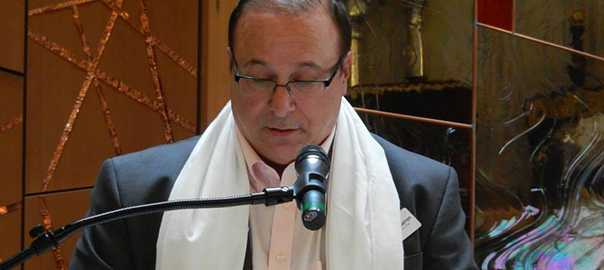Adult B’nei Mitzvah Class of 2014: Adam Barron

Friends and families, thank you for attending our Jewish comings of age. It means a lot.
Soon, you will hear thirteen meticulously practiced chantings of Torah. The sweet major tune melodies belie the gravity of the underlying words.
My portion begins: “Such shall be your law of procedure throughout the ages in all your settlements. If anyone slays a person, the killer may be executed only on the evidence of witnesses; the testimony of a single witness against a person shall not suffice for a sentence of death. “
Importantly, even before prescribing the punishment, the Torah introduces a new standard of proof, the requirement of two witnesses.
But the next sentence is absolute: You may not accept a ransom for the life a murderer who is guilty of a capital crime; [a murderer] must be put to death.”
Is this mandatory death penalty the draconian punishment of an earlier age, or does it affirm the sanctity of the murdered life?
A later passage gives a strange explanation, “you shall not pollute the land in which you live; for blood pollutes the land, and the land can have no expiation {or atonement} for blood that is shed on it, except by the blood of the one who shed it.”
Maggie Parkhurst, Talmud scholar, historical novelist, and BCC teacher, states that the purpose of the Talmud is to teach us to make Jewish law, based on the Torah.
What does the Talmud say? It requires a court of 23 judges, with a decisive, but not unanimous verdict. It requires two eyewitnesses to have each warned the murderer that what he/she was about to commit was a capital crime. In essence, it places so many restrictions on capital punishment, that it makes its use virtually impossible. Why the difference from Torah?
Torah was written at a time when the Israelites created and enforced all their own laws. In contrast, early rabbis lived under the Roman empire’s rule, when, according to historian Reza Aslan, Jews were executed en masse, frequently, arbitrarily and brutally. Thus the rabbis must have found capital punishment revolting.
Thankfully, our time, in the United States, is more civilized. We neither create nor enforce laws, but, through democracy, we can influence policy.
Many Jews today argue that the death penalty is cruel, expensive, not deterring, and that the convicting of even one innocent is unacceptable. For me this approach is too absolute. I agree with the executions of the Adolph Eichmanns of the world, and those, among others, proven to have raped, tortured and murdered a child. I can actually identify with the Torah’s explanation, that in extreme cases, only the murderer’s blood can atone for the shedding of the innocent’s blood. I realize that this may not be popular in this group, but isn’t that the essence of an adult decision . . . having a conviction even if it may make one unpopular?
So today is my Jewish coming of age. I’ve been introduced to the treasure of Jewish teachings, and I’m learning to evaluate and critically apply them. I can merge these to my life experiences, creating my highest moral beliefs. As such, I’m creating my own personal Torah. A Torah which I hope to improve over my lifetime, that I might become more and more the Jew I am meant to be.
Saturday, July 26, 2014




